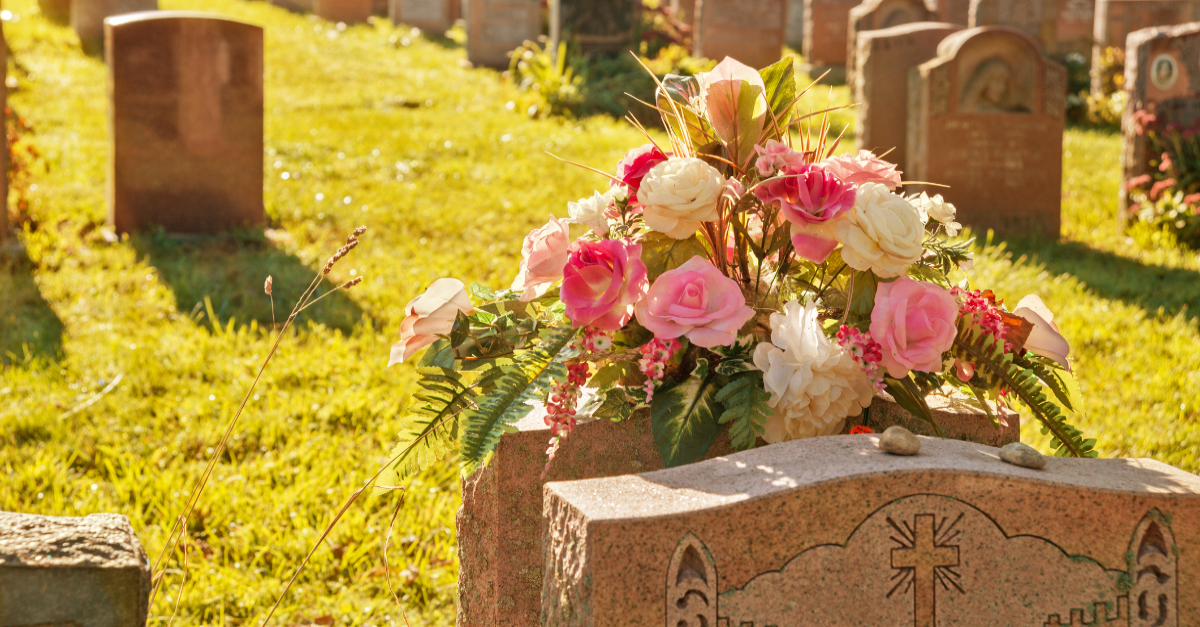Does the Bible Say Anything about Visiting Graves?

When you miss people you love who have passed away, you may want to visit their graves as a special way of remembering them. What does the Bible say about visiting graves? Visiting graves can comfort you in your grief, and even inspire you in ways that strengthen your faith.
Why Do We Visit Graves?
Since it’s not really necessary to visit graves after our loved ones die, and sometimes going to a cemetery can trigger sadness or even fear, why do we visit graves at all? The reason is that visiting graves is a type of spiritual pilgrimage. Grave visits help us connect with God in a special place where we can find hope, healing, and inspiration.
When you go to a grave to remember a family member or friend who has died, remember that their souls aren’t there – only their bodies. You shouldn’t try to communicate with them because praying to the dead isn’t reliable and can be dangerous. However, God will meet you there. God’s presence is always with you, since he promises that “I will never leave you nor forsake you” (Joshua 1:5). Standing at a grave, you can focus on God’s presence and become more aware of it than you may be otherwise. Most likely, you’ll be inspired to reach out to God in prayer at a grave, as you wrestle with the pain of grief and look for comfort while grieving. Graves are powerful reminders of the reality that our earthly lifetimes are limited. Facing the reality of the end of your loved one’s life on earth, it’s natural to think about heaven and hope that your loved one is living on there with God. You’ll find your attention directed toward God as well as to your departed loved one when you visit a grave. In my book Wake Up to Wonder, I describe how a pilgrimage to a specific place where you seek God wholeheartedly can help you encounter God’s wonder and feel awe. A grave is a powerful place to seek God. When you do, you’ll find him, because God promises in Jeremiah 29:13: “You will seek me and find me when you seek me with all your heart.”
Visiting a grave is also a reminder that your own earthy life will come to an end. Psalm 39:4-5 advises: “Show me, Lord, my life’s end and the number of my days; let me know how fleeting my life is. You have made my days a mere handbreadth; the span of my years is as nothing before you. Everyone is but a breath, even those who seem secure.” As you ponder that, you may think about the state of your relationship with God. Are you communicating with God regularly? Is your relationship with God your top priority, or have you let other pursuits distract you from that? Is there sin in your life that you need to confess and repent of to enjoy a closer relationship with God? Do you have doubts you should pray about, asking God to answer your questions and strengthen your faith? You may also consider the kind of legacy you want to leave behind, to help make the world a better place because you were here. Only God can help you do that, because God knows how long you have left to live and how you can best use that time to contribute to the world. A grave is a inspiring place to ask God to help you fulfill your purpose, by letting God’s love flow through your life and using the unique blend of talents God has given you.
What Does the Bible Say about Visiting Graves?
The Bible mentions visiting graves several times:
In the most famous Bible passage about visiting graves, three women visit Jesus’ grave after his Resurrection. Mark 1-8 records: “When the Sabbath was over, Mary Magdalene, Mary the mother of James, and Salome bought spices so that they might go to anoint Jesus’ body. Very early on the first day of the week, just after sunrise, they were on their way to the tomb and they asked each other, ‘Who will roll the stone away from the entrance of the tomb?’ But when they looked up, they saw that the stone, which was very large, had been rolled away. As they entered the tomb, they saw a young man dressed in a white robe sitting on the right side, and they were alarmed. ‘Don't be alarmed,’ he said. ‘You are looking for Jesus the Nazarene, who was crucified. He has risen! He is not here. See the place where they laid him. But go, tell his disciples and Peter, 'He is going ahead of you into Galilee. There you will see him, just as he told you.’ Trembling and bewildered, the women went out and fled from the tomb. They said nothing to anyone, because they were afraid.” This passage, which is part of the Easter story, describes how this group of women visited Jesus’ grave to show respect and love for him and were surprised by an angel there, who gave them a wondrous message about the miracle that had happened. Even though the angel urged them not to be alarmed, they still struggled to absorb what had occurred.
The Bible also describes how Jesus visited the grave of his friend Lazarus. John chapter 11 tells the story. Jesus grieves over Lazarus’ death and cries from the grief he feels (John 11:35). Then, in front of Lazarus’ sisters Mary and Martha, Jesus brings Lazarus back to life (John 11:38-44). Jesus asks the sisters a key question in John 11:40: “Did I not tell you that if you believe, you will see the glory of God?” After showing faith in God at their brother’s grave, Mary and Martha witnessed a miracle there – a miracle that has strengthened the faith of countless other people around the world ever since.
Another Bible passage about visiting graves is Genesis 35:19-20, which describes how Jacob marks Rachel’s grave with a pillar. That passage details an ordinary gesture to honor a departed loved one. Many people mark or decorate graves today.

Photo Credit: ©GettyImages/MarcBruxelle
17 Encouraging Bible Verses about Those Who Have Passed
The Bible includes many verses to help you when you’re grieving the loss of a loved one. Let these 17 verses inspire you:
John 11:25: “Jesus said to her, ‘I am the resurrection and the life. The one who believes in me will live, even though they die. and whoever lives by believing in me will never die. Do you believe this?’”
John 14:1-3: “Do not let your hearts be troubled. You believe in God; believe also in me. My Father’s house has many rooms; if that were not so, would I have told you that I am going there to prepare a place for you? And if I go and prepare a place for you, I will come back and take you to be with me that you also may be where I am.”
Philippians 3:20-21: “But our citizenship is in heaven. And we eagerly await a Savior from there, the Lord Jesus Christ, who, by the power that enables him to bring everything under his control, will transform our lowly bodies so that they will be like his glorious body.”
Romans 14:8: “If we live, we live for the Lord; and if we die, we die for the Lord. So, whether we live or die, we belong to the Lord.”
1 Corinthians 15:51-57: “Listen, I tell you a mystery: We will not all sleep, but we will all be changed — in a flash, in the twinkling of an eye, at the last trumpet. For the trumpet will sound, the dead will be raised imperishable, and we will be changed. For the perishable must clothe itself with the imperishable, and the mortal with immortality. When the perishable has been clothed with the imperishable, and the mortal with immortality, then the saying that is written will come true: “Death has been swallowed up in victory.” “Where, O death, is your victory? Where, O death, is your sting?” The sting of death is sin, and the power of sin is the law. But thanks be to God! He gives us the victory through our Lord Jesus Christ.”
Psalm 116:15: “Precious in the sight of the Lord is the death of his saints.”
John 3:16: “For God so loved the world, that he gave his only Son, that whoever believes in him should not perish but have eternal life.”
Psalm 23:1-6: “The LORD is my shepherd, I lack nothing. He makes me lie down in green pastures, he leads me beside quiet waters, he refreshes my soul. He guides me along the right paths for his name’s sake. Even though I walk through the darkest valley, I will fear no evil, for you are with me; your rod and your staff, they comfort me. You prepare a table before me in the presence of my enemies. You anoint my head with oil; my cup overflows. Surely your goodness and love will follow me all the days of my life, and I will dwell in the house of the LORD forever.”
Deuteronomy 33:27: “The eternal God is your refuge, and underneath are the everlasting arms.”
Romans 8:35-39: “Who shall separate us from the love of Christ? Shall trouble or hardship or persecution or famine or nakedness or danger or sword? As it is written: ‘For your sake we face death all day long; we are considered as sheep to be slaughtered.’ No, in all these things we are more than conquerors through him who loved us. For I am convinced that neither death nor life, neither angels nor demons, neither the present nor the future, nor any powers, neither height nor depth, nor anything else in all creation, will be able to separate us from the love of God that is in Christ Jesus our Lord.”
Isaiah 57:2: “Those who walk uprightly enter into peace; they find rest as they lie in death.”
2 Corinthians 5:8: “We are confident, I say, and would prefer to be away from the body and at home with the Lord.”
1 Thessalonians 4:13-14: “Brothers and sisters, we do not want you to be uninformed about those who sleep in death, so that you do not grieve like the rest of mankind, who have no hope. For we believe that Jesus died and rose again, and so we believe that God will bring with Jesus those who have fallen asleep in him.”
Ecclesiastes 3:1-4: “There is a time for everything, and a season for every activity under the heavens: a time to be born and a time to die, a time to plant and a time to uproot, a time to kill and a time to heal, a time to tear down and a time to build, a time to weep and a time to laugh, a time to mourn and a time to dance…”
Ecclesiastes 12:7: “and the dust returns to the ground it came from, and the spirit returns to God who gave it.”
Matthew 5:4: “Blessed are those who mourn, for they shall be comforted.”
Revelation 21:4: “He will wipe away every tear from their eyes. Death will be no more; grief, crying, and pain will be no more, because the previous things have passed away.”
Conclusion
Visiting the graves of your family and friends who have passed away can be a powerful spiritual pilgrimage. While you won’t be able to talk with your late loved ones there, you can reflect on their lives, honor their legacies, and pray. God will meet you at their graves to comfort you in your grief, strengthen your faith, and even inspire you with wonder.
Photo Credit: ©iStock/Getty Images Plus/PeopleImages

Originally published September 29, 2022.





